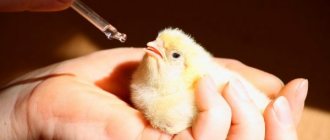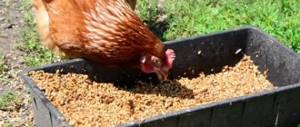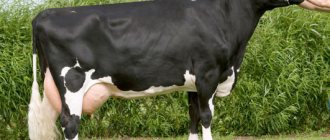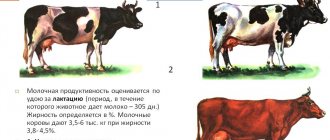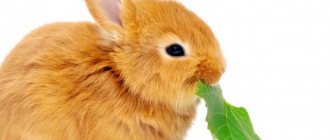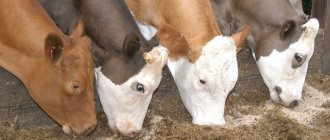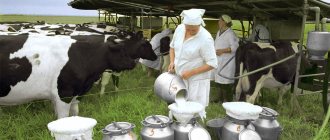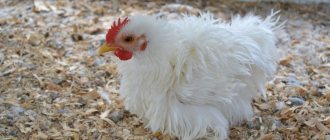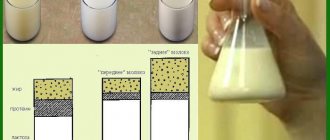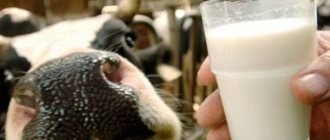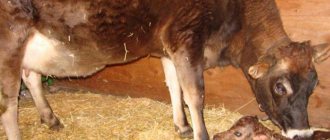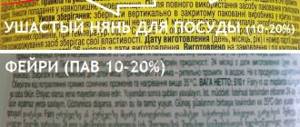Livestock » Cows and bulls
0
4016
Article rating
Kira Stoletova
Vitamins for cows are essential for the growth of the animal. Inexperienced cattle breeders may believe that good housing conditions and comprehensive nutrition (or grazing) are enough for cattle to develop, grow quickly and produce sufficient volumes of milk. But how surprised they are when such a utopia does not happen, and farming suffers more and more losses over time.
Vitamins for cows
And all because, in addition to this, it is necessary to add livestock vitamins to the diet of dairy cows. There are microelements with different purposes; before using any vitamins, you need to know how and in what dose to administer them, at what age and in what period.
The importance of fortification of cattle
Metabolic processes in cattle are not always able to provide the required amount of microelements, therefore vitamin supplements are simply necessary for the animal. To maintain health and active milk production, farmers use special preparations that ensure healthy functioning of the body.
Complex nutrition cannot provide the animal body with all the necessary substances responsible for vital processes, reproductive function, and productivity of the animal. To ensure healthy functionality of the body, you need to give drinking vitamins to the animal. However, microelements are not really needed by cattle all year round, since in the warm season the animal’s body is able to replenish its reserves of nutrients and microelements on its own. It is necessary to carry out fortification in winter, since it is in winter that cattle lack sun and fresh grass. Birds also require a vitamin complex in winter no less than cattle. It is also recommended to keep fattening bulls on a special diet and give them special drugs for growth and weight gain.
Lack of vitamins is fraught with negative consequences for pastoralists.
Their wards stop growing, the young animals begin to eat poorly, and dairy cows produce little milk. Animal immunity decreases, mortality among young animals increases. Reproductive function fades into the background or disappears altogether.
In addition, vitamin deficiency causes many other problems:
- Slowing or stopping growth. Vitamin deficiency in calves and heifers manifests itself in slow development, disproportionate growth of limbs and improper functioning of protective functions.
- Decline in productivity. Vitamins support lactation of dairy animals; without them, livestock productivity is halved. Vitamin deficiency leads to a decrease in muscle mass of species raised for slaughter.
- Chronic diseases. Weak immunity caused by a lack of microelements causes a number of dangerous animal diseases.
- Problems with reproductive function. Vitamin deficiency causes disturbances in the functioning of the genital organs in cows, and in bulls the ability to fertilize is lost.
When raising livestock, remember that there are a number of vitamins for cattle that must be contained in the diet. Moreover, in addition to fortified food, microelements are administered intramuscularly. Pregnant animals, animals after childbirth, young animals and fattening bulls deserve special attention.
Why are vitamins needed for cattle?
The internal resource of the cattle body has a limit. For this reason, animals need microelements from outside. It is no secret for experienced livestock breeders that maintaining the normal functioning of the livestock body is impossible without introducing vitamins for cattle into the diet of animals, which help increase their biological activity.
Even when cows receive complete and balanced nutrition, there remains a need for minerals, which are necessary for healthy metabolism, high productivity, and fertility. The occurrence of any chemical processes in the body is impossible without nutrients.
Cattle do not require all types of vitamins. Some of them are produced by the microflora of the stomach and intestines. But if we are talking about highly productive or dry cows, then these reserves are not able to meet their needs.
In winter, animals' need for vitamins and nutrients increases significantly, which is caused by a lack of sunlight and fresh herbs. Their shortage threatens the death of livestock, especially for young livestock, a decrease in sexual desire and reproductive functions (ovarian dysfunction, impaired spermatogenesis), and an increase in cases of infectious diseases, which is associated with deterioration of immunity.
Vitamin A
The main source of vitamin A is plant foods. However, if you look at the composition of such feeds, you will not find vitamin A there. Instead, it contains carotene, which, when it reaches the intestinal walls, is converted into vitamin A.
The occurrence of processes within cells, their interaction, and formation in tissue depends on the presence of vitamin in the body. Eye health is also directly related to vitamin A. An artificial trace element is essential for dairy cows. With a lack of microelements, the following occurs:
- inflammation of the eyes and skin around them;
- problems with coordination of movements;
- problems with reproduction in livestock;
- loss of reproductive function of sperm in bulls.
Vitamin A deficiency usually affects young animals and cows that produce large amounts of milk at a time. The animal’s body accumulates the microelement and, if necessary, uses its reserves. The greater the lactation and the volume of milk that the cow produces, the greater the amount of vitamin should be added to the cattle diet.
A lack of vitamin A after calving is fraught with health problems not only for the mother herself, but also for the calf. In the cold season, when the livestock diet does not contain fresh grass, the amount of the element is sharply reduced. A calf born in winter has a significantly lower chance of survival than one born at other times, so it is recommended to give vitamin injections intramuscularly. However, it is important to keep in mind that an overdose of the element in the body of livestock leads to serious poisoning, therefore, before starting fortification, it is important to consult a veterinarian.
Standards for vitamin content in the blood of cows and calves
Ideally, before giving cows and calves drugs, their blood should be tested. The analysis will show the content of certain vitamins and microelements in the animal’s blood. Based on the data obtained, the dosage of the drugs should be calculated.
Unfortunately, testing the blood of every cow in the herd is very expensive; not every domestic farmer can afford such luxury. In order not to harm the livestock, you need to know the dosage of vitamins and microelements per head per day. The required data is presented in the table below.
| A (M.E.) | D3 (M.E.) | E (mg) | B1 (mg) | Biotin (mcg) | Nicotinic acid (mg) | Beta carotene (mg) |
| Calves (replacement young cattle) | 30000-50000 | 3000-5000 | 50-100 60-100 | 30 | ||
| Fattening cattle | 40000-70000 | 4000-7000 | 200 | |||
| Cash cows | 80000-150000 | 8000-15000 | 1000 | 15000-20000 | 6000 | 200-400 |
Knowing the established standards, you can independently calculate the dosage of vitamins in injections for fattening cattle, dairy cows or calves. Those who do not know how to inject cows can purchase drugs in the form of drops or tablets - they are added to water or feed mixtures.
Vitamin D
The vitamin promotes animal growth, and its deficiency can cause rickets in calves and young livestock. Vitamin D supplements in the diet help calcium absorption. With a lack of microelements, the following occurs:
- tooth loss in calves;
- cattle rampage;
- development of rickets;
- loss of appetite and disturbances in the digestive system of young animals.
Vitamin deficiency is usually observed in cows with high milk production, which is explained by the accelerated metabolism during milk production. Feeding cows with vitamin D increases milk production and lactation, and accelerated growth is observed in young animals.
Vitamin D is found in plant foods and is also produced in the body by ultraviolet light (sun radiation), so in summer animals grow more actively and produce more milk.
To naturally enrich your body with this microelement, walk your livestock more often. It is especially important to do this in winter and early spring. The content of this element can also be increased artificially: with the help of ultraviolet lamps, feed additives and injections. However, such actions can only be done with the recommendation of a veterinarian, so you should first consult with him.
Vitamin B12
Cyanocobalamin directly affects the circulatory system, hematopoietic processes, density and color of blood. A deficiency of the element causes anemia and slow growth in calves. The appearance of vitamin deficiency is associated with impaired digestive functions and poor absorption of nutrients by the walls of the stomach. Vitamin B12 deficiency occurs:
- loss of appetite;
- wildness, increased activity;
- thinness, exhaustion;
- eczema of the skin;
- problems with coordination;
- reproductive dysfunction;
- the birth of weak or dead young.
Since the symptoms of cyanocobalamin deficiency are similar to the symptoms of deficiency of other vitamins for cattle, it is almost impossible to determine vitamin deficiency of this type on your own. For diagnosis, you need to contact a veterinarian. For treatment, intramuscular injections or special foods and additives are usually prescribed. When the body is enriched with a microelement, the animal gains muscle mass, which is especially useful for meat breeds. Vitamin B12 supplements are also needed by pregnant cows to give birth to healthy calves.
Vitamin E
The microelement regulates the functioning of all internal organs. It is he who is responsible for the regulation of metabolism and fat, reproductive function, proper functioning of the ovaries in cows, and metabolic processes in the uterine mucosa. If there is a deficiency of the element, the animal cannot become pregnant, carry and give birth to a healthy offspring. In the early stages of livestock pregnancy, with a lack of vitamin E, even resorption of the embryo is possible, which is otherwise called hidden abortion.
Young animals experience slow growth and development, lack of weight, and emaciation. If the calf’s body does not receive a microelement for a long time, the muscles atrophy, paralysis appears, and the animal may limp. There are problems with the heart, circulatory system, and blood vessels.
With vitamin E deficiency, bull sperm loses the ability to fertilize. To replenish microelement reserves in the body, artificial supplements are used, which are prescribed by a veterinarian. The best effect is provided by an oil concentrate - trivitamin.
Useful elements
Nutrition and proper care play an important role, but you still can’t do without vitamins and a specialized complex. In addition to vitamins, growth and high lactation require other elements:
- Protein. Protein is necessary for the development and growth of an animal. The main function of protein is construction. Cell organelles, blood vessels and tendons are built from it. With a protein deficiency, the cow loses reproductive function, productivity and the amount of milk decreases sharply, and immunity decreases. Calves become prone to diseases, growth slows down, and limbs develop incorrectly.
- Copper. Livestock diets should include feed containing copper. If this substance is in short supply, cattle lose their appetite and eat poorly. As a result, the animal suffers from anemia, its muscle mass decreases, and taste buds malfunction. In especially severe cases, there is a change in the color of the coat and its loss. The animal's hemoglobin drops and the number of red blood cells decreases. If copper continues to not appear in the diet, the animal stops producing milk and loses its ability to reproduce.
- Iodine. Vitamins for cows for milk also play a special role for the development of livestock. The fat content of cow's milk directly depends on the amount of iodine in the individual's body. When it is deficient, milk becomes low-fat, lactation is reduced to a minimum, and the ability to reproduce livestock is lost. Pregnant cows experience miscarriages (including hidden ones, when the fetus is absorbed in the womb), and the birth of calves ahead of schedule. The offspring is usually weak and does not survive.
- Manganese. The level of manganese in the body affects the reproduction of the animal. Its lack causes the cow’s inability to conceive and bear calves. In calves it manifests itself as slow growth, late puberty, and rapid weight gain. Fat deposits cause deformation of the limbs.
- Salt. Salt affects the functioning of the entire body of cattle, and its concentration determines the healthy development of the animal. Salt helps proteins digest. A deficiency of the mineral leads to a deterioration in appetite, refusal to eat, a decrease in lactation and the amount of milk per milking, impaired reproduction, and a decrease in muscle mass.
What else to add to your diet
For full development, you need not only vitamins, but also substances responsible for the formation of muscles, bones and the immune system. Protein is involved in cell synthesis and forms all organs. Lack of protein in cows after calving manifests itself in the form of deterioration of lactation, increased feed consumption or perversion of appetite. Calves often get sick and do not gain weight well.
Microelements are needed to maintain the vital functions of cows before and after calving. Females lose substances along with milk. Deficiency manifests itself as:
- decreased productivity;
- activation of diseases;
- delay of biochemical processes.
With a lack of copper in cattle, anemia and exhaustion are noted. Adults constantly lick the fur, and calves develop poorly. The microflora of the digestive organs is disrupted, which leads to frequent diarrhea. Weakened animals move little and lose vitamins and calcium from their bones. Copper is contained in hay and grass that grow on red soil and black soil. Feed yeast, meal and bran will help prevent danger.
Iodine is responsible for the functioning of the endocrine system. A lack of microelement provokes fetal death or the birth of a stillborn baby. After calving, cows' milk yield deteriorates, and the fat concentration in milk decreases. Iodine enters the body with greens and hay, enriched with salt and potassium.
Manganese deficiency can cause abortion or calf death. Young animals are born weakened, with congenital pathologies of organs. In females, lactation worsens and the fat content of milk decreases. Special supplements will help fill the deficiency. The substance contains large quantities of feed flour (from meadow grasses, pine needles), wheat bran and fresh herbs. For preventive purposes, carbon dioxide and manganese sulfate are introduced into the menu before and after calving.
Table salt is given to cows before and after calving to provide the body with macroelements sodium and chlorine. The component is not found in plants in the required concentration, so it is added with food. Without it, the functioning of the digestive and nervous systems is disrupted, and lactation worsens. The substance improves food absorption and has an antibacterial effect.
To ensure that the macroelements phosphorus and calcium (8-10 mg) enter the animal’s body during pregnancy, professional premixes are used.
The mineral iron is involved in the synthesis of blood and internal organs. If there is a deficiency, cows develop liver dystrophy, anemia and goiter. 5 weeks before calving, the cow is given intramuscular injections of the drug "Sedimin". Recommended dose – 10 ml.
Important! Probiotics are used to restore the gastrointestinal microflora. The drugs are prescribed to females after childbirth to increase the quantity and quality of milk.
